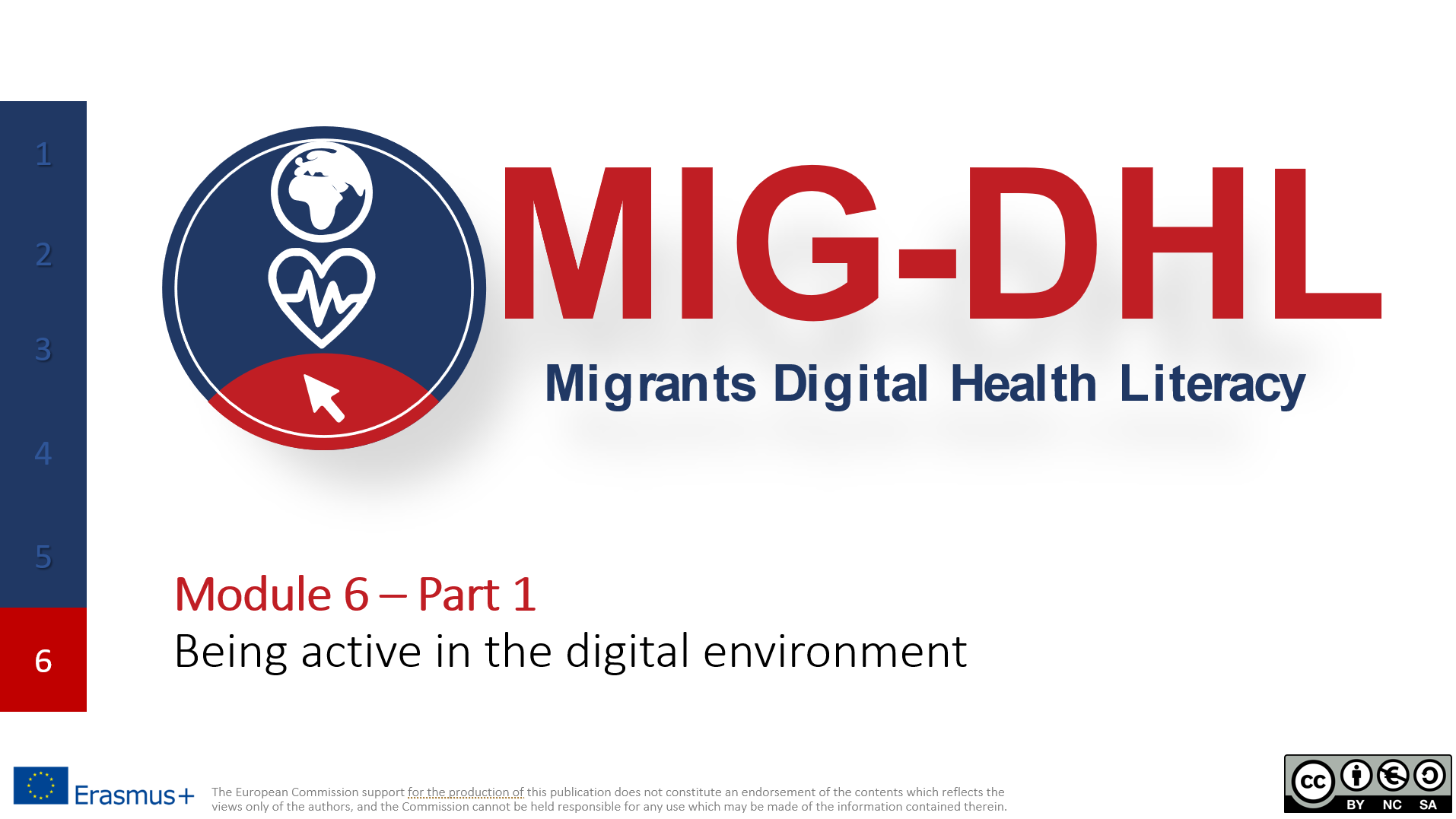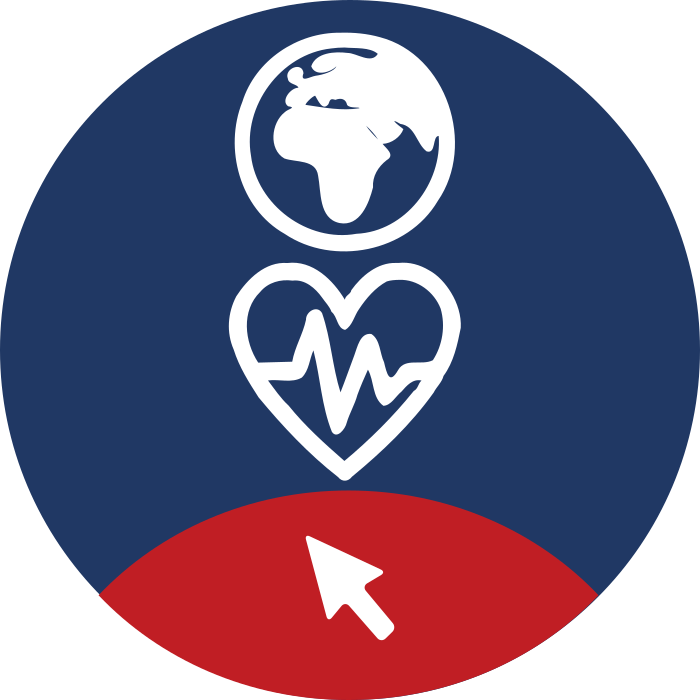Course 6 - Being Active in the Digital Health Environment (Course6-EN)
Training the Trainers on Module 6 - "Being Active in the Digital Health Environment"
Authors:
Pantelis Balaouras, GUnet;
Josemar Alejandro Jimenez, Oxfam;
Jenny Wielga, IAT
Objective
✔ Ability to interact an react on health-related topics in the digital environment
Competences
✔ Knowledge about and ability to join digital communication on health topics
✔ Ability to communicate with medical professionals in a digital way
✔ The ability to evaluate different sources regarding health-related information in the digital environment
✔ Knowledge about data protection and safety in the digital environment
Materials
- Handbook for the trainer (PDF) - For preparing a face 2 face training session. Explains the slides.
- Slides of Module 6 for the trainer (PDF Part 1 , PPT Part1, PDF Part 2, PPT Part 2) - To be used by a trainer in face 2 face training session.
- Online Training Module 6 for the trainee (LINK Part 1, LINK Part 2) - To be used by a trainee in the online training session.
- Guidelines for all Designed Practical Training Activities (DPTAs) for the trainer (PDF) - For preparing the Practical Activities in a face 2 face training session.
The European Commission support for the production of this publication does not constitute an endorsement of the contents which reflects the views only of the authors, and the Commission cannot be held responsible for any use which may be made of the information contained therein. Project number: 2020-1-DE02-KA204-007679.
LessTraining the Trainers on Module 6 - "Being Active in the Digital Health Environment"
Authors:
Pantelis Balaouras, GUnet;
Josemar Alejandro Jimenez, Oxfam;
Jenny Wielga, IAT
Objective
✔ Ability to interact an react on health-related topics in the digital environment
Competences
✔ Knowledge about and ability to join digital communication on health topics
✔ Ability to communicate with medical professionals in a digital way
✔ The ability to evaluate different sources regarding health-related information in the digital environment
✔ Knowledge about data protection and safety in the digital environment
Materials
- Handbook for the trainer (PDF) - For preparing a face 2 face training session. Explains the slides.
- Slides of Module 6 for the trainer (PDF Part 1 , PPT Part1, PDF Part 2, PPT Part 2) - To be used by a trainer in face 2 face training session.
- Online Training Module 6 for the trainee (LINK Part 1, LINK Part 2) - To be used by a trainee in the online training session.
- Guideli
Training the Trainers on Module 6 - "Being Active in the Digital Health Environment"
Authors:
Pantelis Balaouras, GUnet;
Josemar Alejandro Jimenez, Oxfam;
Jenny Wielga, IAT
Objective
✔ Ability to interact an react on health-related topics in the digital environment
Competences
✔ Knowledge about and ability to join digital communication on health topics
✔ Ability to communicate with medical professionals in a digital way
✔ The ability to evaluate different sources regarding health-related information in the digital environment
✔ Knowledge about data protection and safety in the digital environment
Materials
- Handbook for the trainer (PDF) - For preparing a face 2 face training session. Explains the slides.
- Slides of Module 6 for the trainer (PDF Part 1 , PPT Part1, PDF Part 2, PPT Part 2) - To be used by a trainer in face 2 face training session.
- Online Training Module 6 for the trainee (LINK Part 1, LINK Part 2) - To be used by a trainee in the online training session.
- Guideli
Course Description

Objectives
This DPTA 6 “Being active in the digital health environment” focuses on the ability to interact and react on health-related topics in the digital health environment. It should summarize the achieved knowledge in the previous DPTAS and enable the participants to find information and help in the digital environment for their personal health-related issues on their own. As health-topics are often related to personal information and data, to achieve awareness of privacy and security regarding personal data is also an objective of this session. Therefore, this DPTA focuses in specific on the dimensions 6 (Adding content) and 7 (protecting privacy) of Digital Health Literacy. These dimensions are described as followed:
Adding content: To create and edit digital content and also to improve and integrate information and content into an existing body of knowledge while understanding how copyright and licences are to be applied.
Protecting Privacy: To protect devices, content, personal data and privacy in digital environments. To protect physical and psychological health, and to be aware of digital technologies for social well-being and social inclusion. To be aware of the environmental impact of digital technologies and their use.
Participants & roles
- Migrants: About 10 (newcomer) migrants in each country as beneficiaries of the training.
- Migrant peers: About 1-2 migrant peers, who are key persons in the migrant communities or are already integrated in the host country. Migrant peers have a fundamental role to play in the development of this DPTA, given that they have previously been in the same situation that the trainees are currently facing and therefore have a better understanding of the problems the migrants are facing.
- Health professionals (about 1-2): The expected role of health professionals is as an active participant or as an observer. It is advisable to invite health professionals to participate actively in the different sessions of this DPTA as they can provide information from their own experiences about communication on health-related topics in the digital environment. They also have the opportunity to exchange information with users about information and communication tools related to health topics in the digital environment.
Competences
- Knowledge about and ability to join digital communication on health topics.
- Ability to communicate with medical professionals in a digital way.
- Ability of evaluating different sources regarding health-related information in the digital environment.
- Knowledge about data protection and safety in the digital environment.
Training contents
- Learning to find digital communication tools on health topics.
- Digital ways of communication with health professionals.
- Learning how to protect the own privacy in the digital environment and getting aware of specific risks.
Duration
Duration of the session: 5-7 hours.
- Face to face session: 4 hours (2 days- 2 hours per day)
- Online session: 1-2 hours
Transversal training
- Social skills
- Language skills
- Ability of teamwork
- Skills to put in practice theoretical contents
Methodology
- Active and participative
- Face to face training:
- Dialogue
- Teamwork
- Online training:
- Practical implementation -through assignments- of some tips agreed in the classroom.
- Some collaborative work
Training materials
- Face to face sessions:
- PowerPoint presentations
- Word documents.
- Explaining the main concepts shown on PPT
- Survey
This DPTA 6 “Being active in the digital health environment” focuses on the ability to interact and react on health-related topics in the digital health environment. It should summarize the achieved knowledge in the previous DPTAS and enable the participants to find information and help in the digital environment for their personal health-related issues on their own. As health-topics are often related to personal information and data, to achieve awareness of privacy and security regarding personal data is also an objective of this session. Therefore, this DPTA focuses in specific on the dimensions 6 (Adding content) and 7 (protecting privacy) of Digital Health Literacy. These dimensions are described as followed:
Adding content: To create and edit digital content and also to improve and integrate information and content into an existing body of knowledge while understanding how copyright and licences are to be applied.
Protecting Privacy: To protect devices, content, personal data and privacy in digital environments. To protect physical and psychological health, and to be aware of digital technologies for social well-being and social inclusion. To be aware of the environmental impact of digital technologies and their use.
- Migrants: About 10 (newcomer) migrants in each country as beneficiaries of the training.
- Migrant peers: About 1-2 migrant peers, who are key persons in the migrant communities or are already integrated in the host country. Migrant peers have a fundamental role to play in the development of this DPTA, given that they have previously been in the same situation that the trainees are currently facing and therefore have a better understanding of the problems the migrants are facing.
- Health professionals (about 1-2): The expected role of health professionals is as an active participant or as an observer. It is advisable to invite health professionals to participate actively in the different sessions of this DPTA as they can provide information from their own experiences about communication on health-related topics in the digital environment. They also have the opportunity to exchange information with users about information and communication tools related to health topics in the digital environment.
- Knowledge about and ability to join digital communication on health topics.
- Ability to communicate with medical professionals in a digital way.
- Ability of evaluating different sources regarding health-related information in the digital environment.
- Knowledge about data protection and safety in the digital environment.
- Learning to find digital communication tools on health topics.
- Digital ways of communication with health professionals.
- Learning how to protect the own privacy in the digital environment and getting aware of specific risks.
Duration of the session: 5-7 hours.
- Face to face session: 4 hours (2 days- 2 hours per day)
- Online session: 1-2 hours
- Social skills
- Language skills
- Ability of teamwork
- Skills to put in practice theoretical contents
- Active and participative
- Face to face training:
- Dialogue
- Teamwork
- Online training:
- Practical implementation -through assignments- of some tips agreed in the classroom.
- Some collaborative work
- Face to face sessions:
- PowerPoint presentations
- Word documents.
- Explaining the main concepts shown on PPT
- Survey

